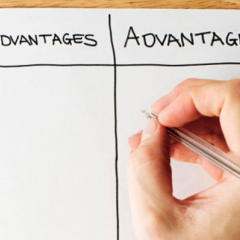
If you want to create a large-scale site for users from all over the world, you will have to care about many things, including web hosting solution. When deciding on the type of hosting, do not rush into any solution without thinking over its pros and cons. Many companies switch to other solutions soon after taking them up. Don’t want to repeat their mistakes? Learn how to select a dedicated server correctly.
Learn 8 things that will help you to decide on a hosting provider worth trying and appropriate hardware configuration of your dedicated server.
1. Influence of downtime
Is failure critical for your business? Before opting for a dedicated server consider how potential downtime is dramatic, because even the most advanced servers do not guarantee 100% uptime. You don’t have an option to scale to several dedicated servers, so if you want to ensure total safety of your web-site, you should additionally order a cloud. It will provide you with backup options in case of server failure.
2. Scalability options
Scalability is very important when you choose a dedicated server. If one day you realize that your server is not enough, and you need more resources, you should be able to switch to a stronger solution. Some providers allow using applications on multiple devices to increase capacity, but in fact it is much more cost-effective to move database to a better server. Besides, you can use such good options as a load balancer that redirects traffic and a cloud to copy your environment.
3. What are your requirements?
What do you expect from your server? Basing on your needs and the amount of traffic to be processed, figure out what an optimal configuration is. You can also ask support team to help you with that. When selecting a server pay attention to the following characteristics:
- Processor/CPU. You are free to choose the amount of cores and processors in a server. Note that higher amount of cores means better performance. Any multi-threaded application benefits from more cores, including web servers and database servers. Also look at clock speed (MHz) and remember that a server with more cores (1 or 8) and less MHz will perform better that the one with fewer cores (1 or 4) and higher MHz. Of course, you should also consider the number of users.
- The better CPU is, the more RAM options are available. Just in case, order a server that allows adding RAM when needed. Luckily, the number of available RAMs for double processors is great! See what the size of your server is when selecting RAM. Servers of present generation use DDR4 technology, it is affordable and is considered to be a standard today.
- Hard drives. RAID set-up is the most optimal for hard drives today, because it prevents failures successfully. With the help of this technology, this system will be operable with minor performance loss until the hard drive is restored. SAS and SSD drives are considered to be the strongest ones today.
4. Load balancing on several dedicated servers
If you have an application that is scaled across several dedicated server, you should have some option for load balancing. With load balancing solution every request will be sent to different servers and the system checks whether a server is functioning. If it doesn’t, a user will be redirected to another server.
5. Calculate average bandwidth usage
The requirements of bandwidth should depend on the expected traffic. If you will use a lot of bandwidth, but can’t predict how much exactly will be required, go for a server with a pretty reserve of traffic included, or even unlimited solution. This way you will know how much traffic is spent.
6. Quality of network
When searching for a server solution, you should take into account the physical location of server. The closer it is located to your end-user, the faster connection will be. Besides, data delivery depends on the quality of network. It is recommended to test the network (sometimes free trials are available).
7. Management options
What are you allowed to do with your server? If you have some applications running on your dedicated server, you should have enough technical skills and experience to maintain your server. It is also good if a server is equipped with a remote management module.
8. Support service
The last but not the least is the level of support service. Make sure that customer support team will figure out a solution that suits your needs. A good provides recommends practices and solutions that meet your exact demands. Besides, high-quality support team should react quickly and give ample answers to your questions.
These recommendations will help you to rent a perfect dedicated server. When you are searching for a dedicated server, don’t hesitate to ask specialists help you, and you will sooner or later find a suitable solution.



comments